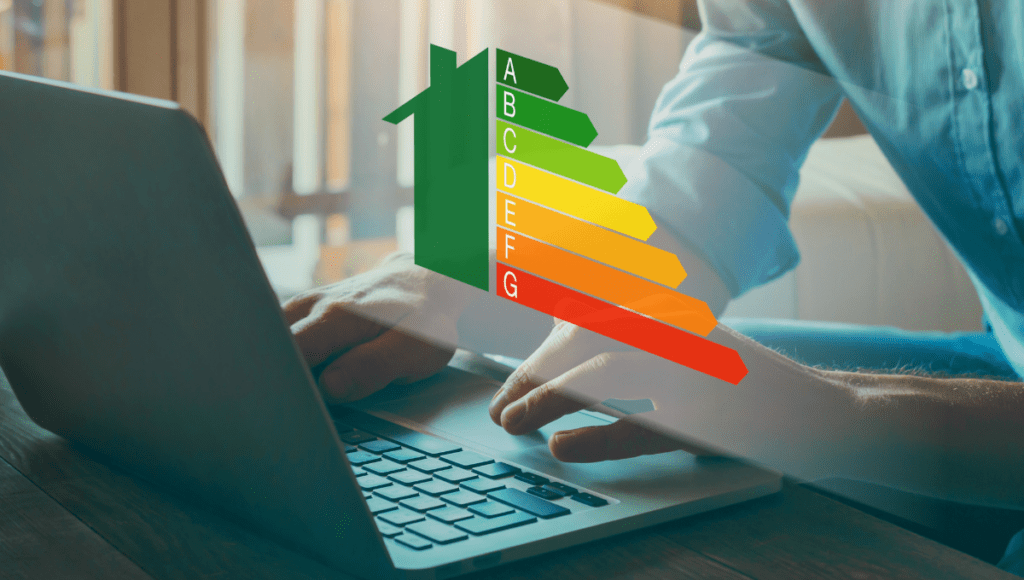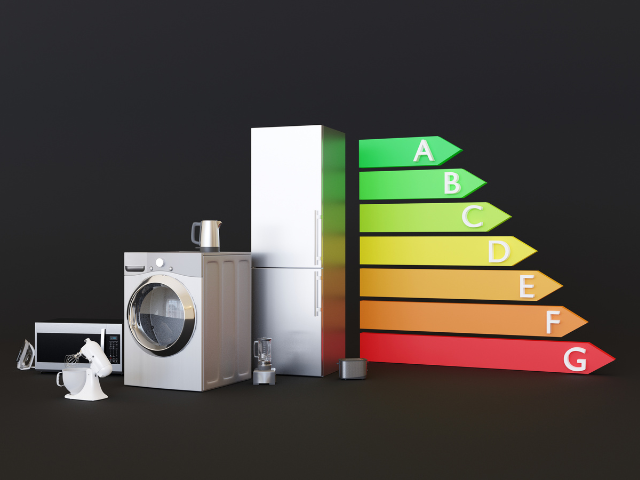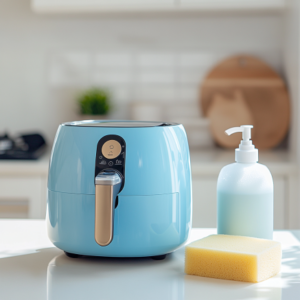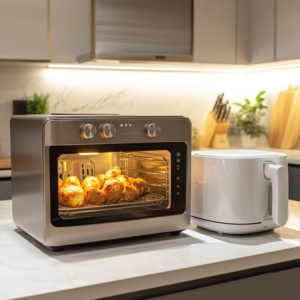Air fryers have gained popularity for their ability to make crispy, delicious meals with less oil, making them a healthier choice for many.
But beyond just health benefits, air fryers are also energy-efficient kitchen tools.
Understanding air fryer energy ratings can help you make informed choices that save money and energy while enjoying tasty meals.
In this comprehensive guide, we’ll break down what air fryer energy ratings mean, how to choose an energy-efficient model, and why it’s essential to consider energy consumption when buying an air fryer.
Ready to learn how to cook efficiently while saving on your electricity bill? Let’s dive in!
What Are Air Fryer Energy Ratings?
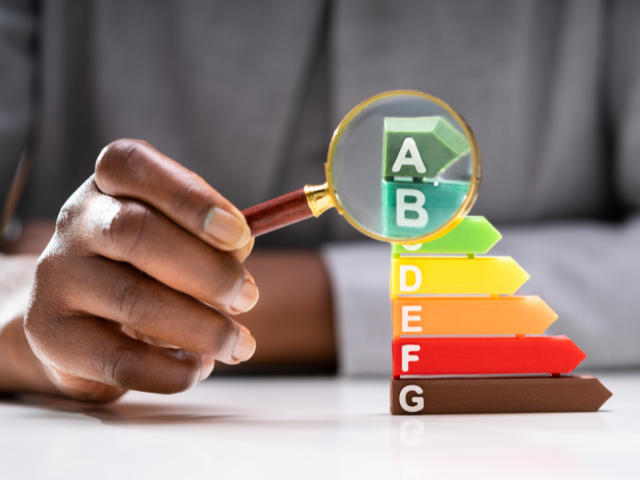
Energy ratings tell you how much power an appliance uses.
For air fryers, this is measured in watts. The wattage of an air fryer typically ranges between 800 watts for smaller models and up to 2,000 watts for larger, family-sized air fryers.
The higher the wattage, the more power it uses, which means it may cook your food faster.
When buying an air fryer, understanding its energy rating can help you estimate how much electricity it will use and how much it might cost to run over time.
An energy-efficient air fryer will cook food faster while using less energy, which is better for the environment and your wallet.
Key Points:
- Wattage: Air fryers usually range from 800 to 2,000 watts.
- Higher wattage: Cooks food faster but uses more energy.
- Lower wattage: More energy-efficient but may take longer to cook food.
How to Read Air Fryer Energy Ratings
You’ll see the wattage listed when you look at an air fryer’s specifications.
The wattage tells you how much power the appliance uses when it’s on.
Here’s a simple breakdown of how to read energy ratings for air fryers:
- 800 to 1,200 watts: These models are ideal for small air fryers that cook for one or two people. They use less energy but may take longer to cook food.
- 1,200 to 1,500 watts: These models are suitable for medium-sized air fryers that can cook meals for small families. They strike a balance between cooking time and energy usage.
- 1,500 to 2,000 watts: These models are best for larger air fryers that can cook enough food for a family of four or more. They will cook food faster but use more energy.
By comparing the wattage of different air fryers, you can choose one that fits your cooking needs while also being mindful of energy efficiency.
Why Air Fryer Energy Ratings Matter
Understanding air fryer energy ratings is important because it can help you manage your electricity usage.
Appliances with higher wattage use more energy, which can lead to higher electricity bills.
By choosing an energy-efficient air fryer, you can save money in the long run while still enjoying your favorite meals.
In addition, energy-efficient air fryers are better for the environment because they reduce overall energy consumption.
Fewer resources are needed to power your home, which helps reduce your carbon footprint.
For more ways to cook efficiently and eat healthily, check out the Best Vegetarian Air Fryer Cookbook UK, available on Amazon. It contains easy and delicious air fryer recipes!
How to Choose an Energy-Efficient Air Fryer
If you want to choose an energy-efficient air fryer, here are a few things to consider:
1. Size Matters
The larger the air fryer, the more power it will typically use.
A smaller air fryer (800 to 1,200 watts) may be more than enough if you cook for one or two people.
However, if you have a large family or like to meal prep, you might want a more prominent air fryer, even though it will use more energy.
2. Cooking Time
Higher-wattage air fryers cook food faster, which can be more energy-efficient if you’re looking to prepare meals quickly.
A lower-wattage air fryer may take longer to cook food, but it will use less energy if you’re okay with waiting.
3. Energy-Saving Features
Some air fryers have energy-saving features like automatic shutoff, which turns the fryer off once the food is cooked.
This can prevent wasted energy and help lower your electricity bill. Look for air fryers with timers and auto-shutoff features for maximum efficiency.
- Tip: Air fryers with timers and auto-shutoff can save energy by preventing overcooking and unnecessary power use.
Comparing Air Fryer Energy Costs
The cost of running an air fryer depends on its wattage and how often you use it.
Here’s a simple way to calculate how much it will cost to run your air fryer:
- Find the wattage of your air fryer (e.g., 1,500 watts).
- Convert the watts to kilowatts (1,500 watts = 1.5 kilowatts).
- Multiply the kilowatts by the number of hours you use the air fryer (e.g., 1.5 kilowatts × 0.5 hours = 0.75 kilowatt-hours).
- Check your electricity rate (e.g., 0.15 per kilowatt-hour).
- Multiply the kilowatt-hours by your electricity rate (e.g., 0.75 × 0.15 = 0.1125).
In this example, it would cost around 11 cents to run the air fryer for 30 minutes.
For more energy-efficient cooking ideas and meal inspiration, check out the Best Vegetarian Air Fryer Cookbook UK on Amazon!
Tips for Reducing Energy Use with Your Air Fryer
Even if you already have an air fryer, there are ways to reduce energy usage while cooking.
Here are some tips to help you cook more efficiently:
- On’t overcrowd the basket: When you overcrowd your air fryer basket, the air can’t circulate properly, leading to longer cooking times and more energy use.
- Use the correct settings: Follow the recommended temperature and cooking time for the food you’re preparing. Using the proper settings ensures your air fryer works efficiently.
- Preheat when necessary: Some air fryers require preheating, while others don’t. Check your air fryer’s manual to determine when it’s required, as preheating uses extra energy.
By following these simple tips, you can ensure that your air fryer is as energy-efficient as possible, helping you save time and power.
Conclusion
Understanding air fryer energy ratings is essential to make intelligent decisions about your kitchen appliances.
By choosing an air fryer with the correct wattage for your needs, you can save on energy costs while still preparing delicious meals.
Whether you need a small air fryer for simple snacks or a larger model to feed a family, being mindful of the wattage and energy usage can make a big difference in your electricity bills and environmental impact.
Discover the Best Vegetarian Air Fryer Cookbook UK and enjoy a variety of mouthwatering, easy-to-make recipes that fit perfectly into your healthy lifestyle! Plus, don’t forget to check out our recently published articles for more tips, reviews, and air fryer inspiration.



